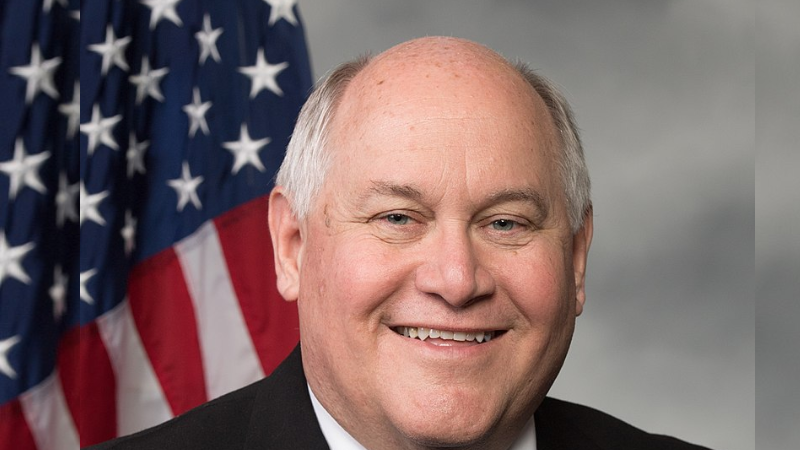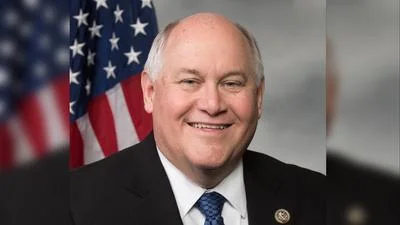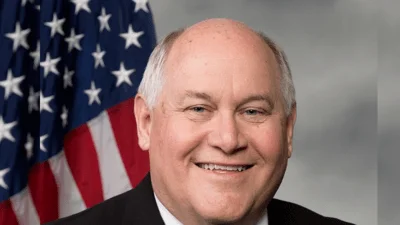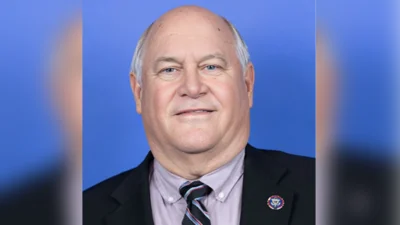Congressman Ron Estes (R-Kansas) | Congressman Ron Estes Official Website
Congressman Ron Estes (R-Kansas) | Congressman Ron Estes Official Website
WASHINGTON – Rep. Ron Estes testified in support of his R&D expensing bill in the House Committee on Small Business. He introduced the legislation earlier this year with Rep. John Larson (D-Connecticut).
"Right now, the United States is lagging behind in R&D – a trend that’s been happening for a while," said Rep. Estes in his testimony. "The American Innovation and R&D Competitiveness Act is the right solution to help small businesses in our districts – from Kansas to Texas to New York to Pennsylvania and everywhere else that could benefit from jobs, opportunities and economic growth."
On Tuesday, April 18, Reps. Estes and John Larson reintroduced H.R. 2673 – the American Innovation and R&D Competitiveness Act. They were joined by Reps. Darin LaHood (R-Illinois), Suzan DelBene (D-Washington), Jodey Arrington (R-Texas), Jimmy Panetta (D-California) and 60 additional original cosponsors, with nearly 100 cosponsors now on the bill. Rep. Estes also delivered remarks on the House floor in April, and numerous organizations offered their support following the bill’s introduction.
Watch Rep. Estes' testimony in committee
Full Remarks:
Thank you, Chairman Meuser, Ranking Member Landsman, Chairman Williams, and all the members of the Small Business Committee, for allowing me to testify today on a critical, bipartisan bill that impacts all of our districts – the American Innovation and R&D Competitiveness Act.
On Tax Day of this year, I reintroduced this common sense bill with my colleague John Larson, along with Representatives LaHood, DelBene, Arrington, Panetta and 56 additional original cosponsors. The bill has continued to gain support and has nearly 100 cosponsors today – evenly split between Republicans and Democrats.
The bill is straightforward. It corrects a tax issue businesses face when conducting research and development. The American Innovation and R&D Competitiveness Act allows for immediate expensing on eligible R&D costs, bringing us back to where we were just a few years ago and securing our dominance in research and development.
Full expensing for R&D was allowed through the end of 2021. However, since the beginning of 2022, businesses have been required to spread out or amortize R&D expenses over five years for domestic R&D or 15 years for foreign R&D.
Rather than extend the immediate expensing for only a few years, this a permanent solution that provides clarity and stability for innovators, businesses and workers.
And this legislation will certainly help small businesses here in the United States and encourage economic development.
In fact, the Association of Equipment Manufacturers said the bill “offers a much-needed boost for the equipment manufacturing industry at a time when America faces adverse inflation and strained supply chains.”
AEM isn’t the only organization praising the bill. The National Taxpayers Union featured this legislation on their “no-brainer” list in 2020. The list is a collection of 10 bills that NTU deems as “no-brainer” bills that have bipartisan support and should be easily passed by Congress. However, they only recognize bills once, they did include this legislation as an honorable mention on the following year, and sent letters of support to members of the House Ways and Means Committee in this Congress.
The Aerospace Industries Association, Semiconductor Industry Association, Plastics Industry Association, Information Technology Industry Council and National Association of Manufacturers also wrote op-eds and issued statements of support.
They all know that where R&D occurs, jobs and economic opportunities also follow. And, this isn’t just about major corporations. R&D supports businesses of all sizes. According to the R&D Coalition, about 15% of private U.S. R&D investments are made by small businesses with fewer than 500 employees.
And to some degree, that has a more outlying impact than it does for larger businesses.
Right now, the United States is lagging behind in R&D – a trend that’s been happening for a while. According to the R&D Coalition, the U.S. share of global R&D investments in 2019 was 30%, down from 40% in 1999. Unlike the United States, China’s global share of R&D investment has gone up – it was 24% in 2019, a big jump from just 5% in the year 2000. That means China’s R&D investments have increased by 400% in just two decades
And here’s how they changed the direction of their R&D presence. China has implemented a deduction of up to 200% on eligible R&D investments. That's an equivalent of 10 times the amount of what the current U.S. tax code allows.
Without an incentive for homegrown R&D, the U.S. also loses out on creating new jobs. The R&D Coalition says, “For every $1 billion of U.S. R&D spending, 17,000 jobs earning $1.4 billion are supported in the United States.” They also note that unless the R&D amortization policy is reversed, the United States stands to lose 410,000 jobs, $57.5 billion in labor income, and $71 billion in R&D spending over the next 10 years.
The American Innovation and R&D Competitiveness Act is the right solution to help small businesses in our districts – from Kansas to Texas to New York to Pennsylvania and everywhere else that could benefit from jobs, opportunities and economic growth.
As a former member of this committee, I know that you all have a vested interest in supporting the small businesses that are economic engines of our country, and I hope you’ll consider joining as cosponsors.
Today’s research and development dollars create tomorrow’s jobs, and we need to keep R&D dollars inside our country, where they can help strengthen American businesses and workers.
I want to thank my friend from Connecticut, Congressman Larson. We’ve worked over multiple Congresses to make this legislation a reality, and now that American companies have had a year without immediate expensing, I’m cautiously optimistic that this is the year that this common sense bill will become law.
Thank you again for allowing me to testify today.
Original source can be found here.





 Alerts Sign-up
Alerts Sign-up